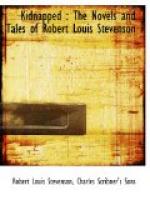So we lay for about a quarter of an hour, whiles whispering, whiles lying still and hearing nothing earthly but the washing of the water on the piers. At last there came by an old, hobbling woman with a crutch stick; who first stopped a little, close to where we lay, and bemoaned herself and the long way she had travelled; and then set forth again up the steep spring of the bridge. The woman was so little, and the night still so dark, that we soon lost sight of her; only heard the sound of her steps, and her stick, and a cough that she had by fits, draw slowly farther away.
“She’s bound to be across now,” I whispered.
“Na,” said Alan, “her foot still sounds boss* upon the bridge.”
* Hollow.
And just then—“Who goes?” cried a voice, and we heard the butt of a musket rattle on the stones. I must suppose the sentry had been sleeping, so that had we tried, we might have passed unseen; but he was awake now, and the chance forfeited.
“This’ll never do,” said Alan. “This’ll never, never do for us, David.”
And without another word, he began to crawl away through the fields; and a little after, being well out of eye-shot, got to his feet again, and struck along a road that led to the eastward. I could not conceive what he was doing; and indeed I was so sharply cut by the disappointment, that I was little likely to be pleased with anything. A moment back and I had seen myself knocking at Mr. Rankeillor’s door to claim my inheritance, like a hero in a ballad; and here was I back again, a wandering, hunted blackguard, on the wrong side of Forth.
“Well?” said I.
“Well,” said Alan, “what would ye have? They’re none such fools as I took them for. We have still the Forth to pass, Davie—weary fall the rains that fed and the hillsides that guided it!”
“And why go east?” said I.
“Ou, just upon the chance!” said he. “If we cannae pass the river, we’ll have to see what we can do for the firth.”
“There are fords upon the river, and none upon the firth,” said I.
“To be sure there are fords, and a bridge forbye,” quoth Alan; “and of what service, when they are watched?”
“Well,” said I, “but a river can be swum.”
“By them that have the skill of it,” returned he; “but I have yet to hear that either you or me is much of a hand at that exercise; and for my own part, I swim like a stone.”
“I’m not up to you in talking back, Alan,” I said; “but I can see we’re making bad worse. If it’s hard to pass a river, it stands to reason it must be worse to pass a sea.”
“But there’s such a thing as a boat,” says Alan, “or I’m the more deceived.”
“Ay, and such a thing as money,” says I. “But for us that have neither one nor other, they might just as well not have been invented.”
“Ye think so?” said Alan.
“I do that,” said I.
“David,” says he, “ye’re a man of small invention and less faith. But let me set my wits upon the hone, and if I cannae beg, borrow, nor yet steal a boat, I’ll make one!”




